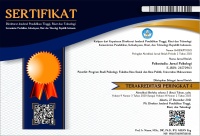Efektivitas Pelatihan Asertif Sebagai Upaya Mengatasi Perilaku “Bullying” di SMPN A Surabaya
Abstract
Bullying is one of the serious problems that is vulnerable to occur in adolescence as experienced by students of 9th grade SMPN A Surabaya. Bullying has a variety of negative impacts on victims and people who witness or bystander that see bullying behavior, that is including physical and psychological impacts. Bullying can be overcome by assertive behavior. Assertive behavior makes the victim and bystander able to express opinions straightforwardly and boldly without hurting the offender to stop bullying behavior. Assertive behavior can be enhanced through assertive training. This research was conducted with the aim of seeing the effectiveness of assertive training to: (1) increase students' understanding of bullying and assertive behavior; and (2) increasing assertive behavior of students to be able to overcome bullying at schools. This research is a quantitative research with experimental method. The type of experiments conducted are one group pretest-posttest design. Subjects are selected by purposive sampling. The subjects involved were 25 students in 9th grade students of SMPN A Surabaya. Assertive behavior is measured by the assertiveness scale by Robert E. Alberti and Michael L. Emmons (2002) which has been translated into Indonesian by Nabila (2015). Assertiveness scale is given before and after training for each subject. Subjects underwent 8 training sessions which were held for 2 days. The collected data was analyzed by paired sample t-test. The results show that: (1) there are significant differences in the subject's understanding of bullying and assertiveness before and after the study, where the subject's average understanding increases after training; (2) student assertiveness behavior significantly increases after training. Overall, assertive training is effective for increasing student understanding and effective for enhancing assertive behavior.
Keywords
Full Text:
PDFReferences
Abbott, N., Cameron, L. (2014). What Makes a Young Assertive Bystander? The Effect of Intergroup Contact, Empathy, Cultural Openness, and In-Group Bias on Assertive Bystander Intervention Intentions. Journal of Social Issues. 70: 167-182.
Adriansyah, M. A., & Rahmi, M. (2012). Faktor-Faktor Yang Mempengaruhi Moralitas Remaja Awal. Psikostudia: Jurnal Psikologi, 1(1), 1-16.
Alberti, R. E & Emmons, M. L. (2008). Your perfect right: Assertiveness and equality in your life and relationship (9th ed.). Atascadero, CA: Impact Publisher
Alkaya, A., Avşar, F. (2017). The effectiveness of assertiveness training for school aged children on bullying and assertiveness level. Journal of Pediatric Nursing. 36: 186- 190.
Asher, Y., Stark, A., & Fireman, G. D. (2017). Comparing electronic and traditional bullying in embarrasment and exclusion scenario. Computers in Human Behavior, 76, 26-34.
Balakrishnan, V. (2018). Actions, emotional reactions and cyberbullying – From the lens of bullies, victims, bully-victims and bystanders among Malaysian young adults. Talematics and Informatics, 1-11.
Benitez, J. L., & Justicia, F. (2009). Bullying: Descroption and analysis of phenomenon. Electronic Journal of Research in Educational Psychology, 9, 4(2), 151-170.
Bishop, S,. (2010). Develop your assertiveness (2nd ed.). London : Koran Page.
Coloroso, B. (2006). Penindas, tertindas, dan penonton: Resep memutus rantai kekerasan anak dari prasekolah hingga smu. Jakarta : Serambi
Diah, I. (2018, 20 November). Hari anak sedunia, tingkat kekerasan pada anak Indonesia meningkat. http://www.muslimahdaily.com [Online]. Diakses dari http://www.muslimahdaily.com/news/item/791-hari-anak-seduniatingkatkekerasanpada-anak-indonesia-meningkat.html.
Hardhiyanti, R. S., Pandjaitan, L. N., Arya, L. (2020). Efektivitas social skills training (SST) untuk mereduksi intensitas bullying pada remaja. Jurnal Psikostudia, 9 (1), 1-10.
Indra, Z. (2019, 28 April). Indonesia ranking kedua bullying sedunia. Tribunpekanbaru.com [Online]. Diakses dari http://pekanbaru.tribunnews.com/2019/04/28/indonesiaranking-kedua-bullyingsedunia.
Nabila, A. I. (2015). Pengaruh Pemberian Pelatihan Asertif terhadap Kecenderungan Kenakalan Remaja pada Siswa Kelas X Sekolah Menengah Kejuruan Bhineka Karya Surakarta. Jurnal Wacana, 1(5).
Nurridha, F. (2019, 3 November). Kasus bullying meningkat, pelaku didominasi oleh remaja. https://kumparan.com [Online]. Diakses dari https://kumparan.com/@kumparanstyle/kasus-bullying-meningkat-pelakudidominasioleh-remaja
Oliveira, F. R., Menezes, T. A., Irffi, G., & Oliveira, G. R. (2017) Bullying effect on student’s performance. Economi A, 126, 1-17.
Rivers, I., Poteat, V. P., Noret, N., & Ashurst, N. (2009). Observing bullying at school: The mental health implications of witness status. School Psychology Quarterly, 24 (4), 221-223.
Santrock, J. W. (2011). Educational psychology (5th ed). New York, NY: McGraw Hill
Saptandari, E. W., & Adiyanti, M. G. (2013). Mengurangi bullying melalui program pelatihan “guru peduli”. Jurnal Psikologi, 40 (2), 193-210.
Veenstra, R., Lindenberg, S., Oldehinkel, A. J., Winter, A. F., & Verhulst, F. C. (2005). Bullying and victimization in elementary schools: a comparison of bullies, victims, bully/victims, and uninvolved preadolescents. Developmental Psychology, 4, 672 682.
DOI: http://dx.doi.org/10.30872/psikostudia.v9i2.3868
Refbacks
- There are currently no refbacks.
Copyright (c) 2020 Psikostudia : Jurnal Psikologi

This work is licensed under a Creative Commons Attribution-ShareAlike 4.0 International License.
Indexing by :
_________________________________________
PSIKOSTUDIA: Jurnal Psikologi Published by Faculty of Social and Political Siences, University of Mulawarman, Samarinda, East Kalimantan and This work is licensed under a Creative Commons Attribution-ShareAlike 4.0 International License.
_________________________________________
PSIKOSTUDIA: Jurnal Psikologi
Department of Psychology
Faculty of Social and Political Siences, University of Mulawarman
Jl. Muara Muntai Kampus Gn. Kelua Samarinda 75411
Phone: +62 813 35350368
E-Mail: psikostudia@fisip.unmul.ac.id




















